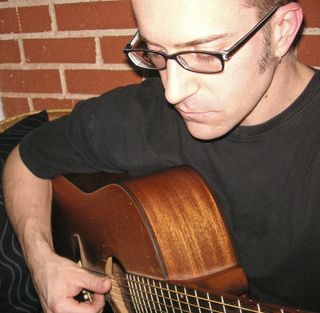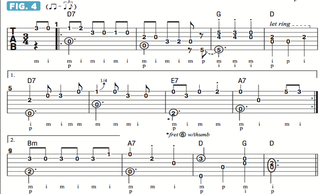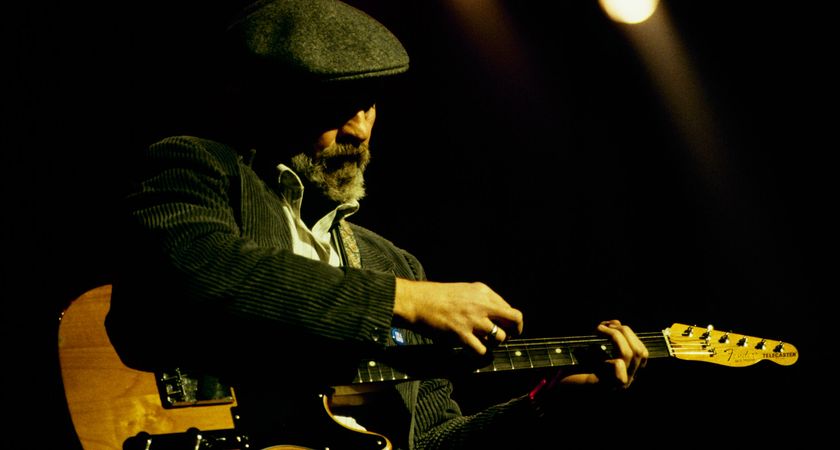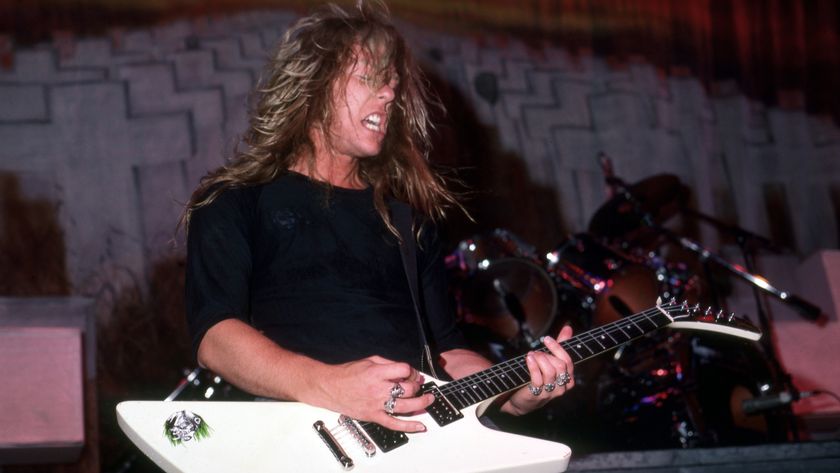Acoustic Nation with Dale Turner: The Inimitable, Soulful Guitar Style of Joseph Spence

What happens when you mix bluesy, Robert Johnson–style fingerpicking and tropical “Calypso” grooves, with repertoire consisting of spiritual hymns and sea shanties (maritime work songs, akin to your Pirates of the Caribbean soundtrack faves), sung by a gruff-voiced, scat-singing, foot-stomping stonemason?
You get the inimitable Joseph Spence (1910–1984), an Andros Islands, Bahamas-born super picker who, once his late Fifties Folkways/Smithsonian recordings were discovered, profoundly influenced the likes of Ry Cooder, Richard Thompson, David Lindley, the Grateful Dead and Taj Mahal, among others.
Jazz fans have likened Spence to “what Thelonious Monk might sound like, if he played guitar.” (Monk was known for, among other things, angular melodies, dissonant improvisations and unpredictable rhythms.)
Sprinkle in the rhythmic grunts, groans and other guttural sounds Spence emits while improvising (think “Popeye mixed with Tom Waits”), and the breadth of his unique musicality becomes clear.
But verbal descriptions alone do not do Spence’s guitar style justice; seek out recordings of the tracks mentioned herein (and more) for a harrowing aural treat. And before we get started, note that virtually all of Spence’s works are performed in drop-D Tuning (low to high, D A D G B E).
We’ll kick off this lesson with a pair of relatively conventional passages, beginning with a blues turnaround and tag that’s similar to what Spence plays in “Coming in on a Wing and a Prayer” (see FIGURE 1), which opens Music of the Bahamas, Vol. 1: Bahaman Folk Guitar (recorded soon after music historian Sam Charters discovered Spence in 1958).
Note that pick-hand fingerings shown in this lesson are merely suggestions; there is no video footage of Spence performing, though he purportedly picked with only his thumb and index finger.
FIGURE 2, a bouncy passage in 3/4 meter that’s not unlike Spence’s playing in “There Will Be a Happy Meeting in Glory,” gives you a taste of the guitarist’s snappy, staccato phrasing. Pull on the strings a bit, and let them snap back against the frets, for percussive effect.
FIGURE 3, also inspired by “Coming in on a Wing and a Prayer” (the version issued on Spence’s 1971 release, Good Morning Mr. Walker) shows how he could create a “call-and-response” effect by himself, playing a melody on the upper strings (the “call”), followed by a bass register fill (the “response”). Keep in mind Spence would also sing while playing these types of passages, with the two elements combining to create an otherworldly solo performance. (This song’s gurgling scat solo is a must-hear!)
Spence released three other solo albums in his lifetime: 1964’s Happy All the Time (recorded in his living room), 1971’s Good Morning Mr. Walker and 1980’s Living on the Hallelujah Side (a collection of various recordings from 1972 and 1978).
But it is the 1978 compilation, The Real Bahamas: Vol. 2, that includes “That Glad Reunion Day” (also featured in the soundtrack to the 2003 film, Open Water), which informs FIGURE 4.
This extended example showcases much of what Spence was all about: Thumping bass notes supporting blazing single-note lines (bars 1 and 2) and chord partials (bars 3 and 4), bluesy bends (bar 5) and polyrhythmic phrasing (bars 5 and 6), with an eight-note melody that suggests a different meter and tempo played across two bars of 3/4.


Get The Pick Newsletter
All the latest guitar news, interviews, lessons, reviews, deals and more, direct to your inbox!
A singer-songwriter/multi-instrumentalist/film composer, Musician's Institute instructor, and author of 50+ transcription/instructional books, Dale Turner is also Guitar World's "Hole Notes"/"Acoustic Nation" columnist, and the former West Coast Editor of Guitar One magazine. Some of Dale’s old, weird, rare, and/or exotic instruments are featured in his score for WEEDS, the first animated short completed within the Filmmakers Co-op at Disney Feature Animation. His most recent CD, Mannerisms Magnified, was praised by Guitar Player magazine for its "Smart pop tunes that are crammed with interesting guitar parts and tones ... Like what the Beach Boys might do if they were on an acid trip that was on the verge of getting out of control. Yeah!"



